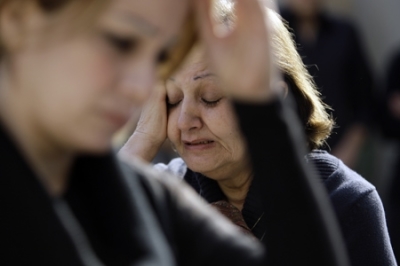Do We Care That Our Family Is Hurting?

"Remember those who are in prison, as though in prison with them, and those who are mistreated, since you also are in the body." – Hebrews 13:3
One of the most natural responses we have as humans is the drive and the desire to protect our families. We'll fight for our loved ones, sacrifice our well-being for them, and most of us would put our own lives in danger so that our families could continue to live.
It is natural for us to want to take a stand and fight for our families. We're deeply connected to them. We laugh when they laugh, and we cry when they cry. We'll rejoice when they rejoice and we'll suffer when they suffer. We care deeply about them, don't we?
If that is the case, why do we seem to be so passive about our faith family being harmed everyday? The Bible refers the Christian community as the family of God, and with it comes a command to love and serve one another as a family. "So then you are no longer strangers and aliens, but you are fellow citizens with the saints and members of the household of God" (Ephesians 2:19). "Love one another with brotherly affection. Outdo one another in showing honor. Do not be slothful in zeal, be fervent in spirit, serve the Lord. Rejoice in hope, be patient in tribulation, be constant in prayer. Contribute to the needs of the saints and seek to show hospitality" (Romans 12:10-13).
Open Doors USA defines Christian persecution as "any hostility experienced from the world as a result of one's identification as a Christian. Beatings, physical torture, confinement, isolation, rape, severe punishment, imprisonment, slavery, discrimination in education and employment, and even death are just a few examples of the persecution they experience on a daily basis." According to the Pew Research Center, over 75 percent of the world's population lives in areas with severe religious restrictions, which means that Christians in more than 60 countries face persecution from their governments or from others for simply confessing Jesus as their King.
As the church, we can't just be bothered by this truth. We must be broken over it. These are not just numbers. These are people. We are a family. Millions of our brothers and sisters in Christ are suffering simply because they are a part of our family, and because our Heavenly Father is their Father. Just like we would be devastated and motivated to action if it were our physical family, we need to be equally—if not more—devastated and motivated to action because it is our spiritual family.
Here are at least four things we should be doing as a church for our persecuted family:
- Pray: As a church family, we should never talk to people about God until we talk to God about people. Every great movement starts with a prayer movement. May our family's house be known as a house of prayer. "Even those I will bring to My holy mountain and make them joyful in My house of prayer. Their burnt offerings and their sacrifices will be acceptable on My altar; for My house will be called a house of prayer for all the peoples"(Isaiah 56:7). Prayer is one of the most beautiful mysteries of God because it moves His heart to action in a way that our finite minds can't truly comprehend. Pray, family. Then pray some more.
- Educate: Keep the reality of our hurting family ever before us. We'd never forget, ignore or move past the fact of one of our family members is suffering. Therefore, we should never do that with our faith family. The leaders of the church, such as pastors, elders and small group leaders, should always keep this reality in front of the local churches they are called to lead. There are many helpful websites to educate us on the persecuted church. Here are a few: Save the Persecuted Christians, Open Doors, The Voice of the Martyrs, Joshua Project, Samaritan's Purse, Barnabas Aid and Christian Freedom International.
- Write: This is a great ministry for small groups or Bible study classes within the church. Write letters to your persecuted family that are prayers for them, words of encouragement to them or letters simply filled with Scripture. Some areas don't have access to the Word of God, and your letters could be the only copy of Scripture that they can obtain. Many of Paul's writings in the New Testament are sent to hurting Christians that are facing persecution: "For you, brothers, became imitators of the churches of God in Christ Jesus that are in Judea. For you suffered the same things from your own countrymen as they did from the Jews, who killed both the Lord Jesus and the prophets, and drove us out, and displease God and oppose all mankind by hindering us from speaking to the Gentiles that they might be saved—so as always to fill up the measure of their sins. But wrath has come upon them at last" (1 Thessalonians 2:14-16).
- Advocate: As a church, consider petitioning those with political power to do something about Christian persecution. In the past, the United States has often been long-delayed in recognizing Christian persecution when it begins to arise in certain areas outside our borders. Most of the time, it is only after pressure from the people of God who are broken over what is happening to their brothers and sisters in Christ that our government will move to action with appropriate measures.
This is our family. These are our brothers and sisters. It breaks the heart of our Father to see His children being persecuted, and it should break our hearts as well. As a church, let's make sure they are never ignored or forgotten.





















